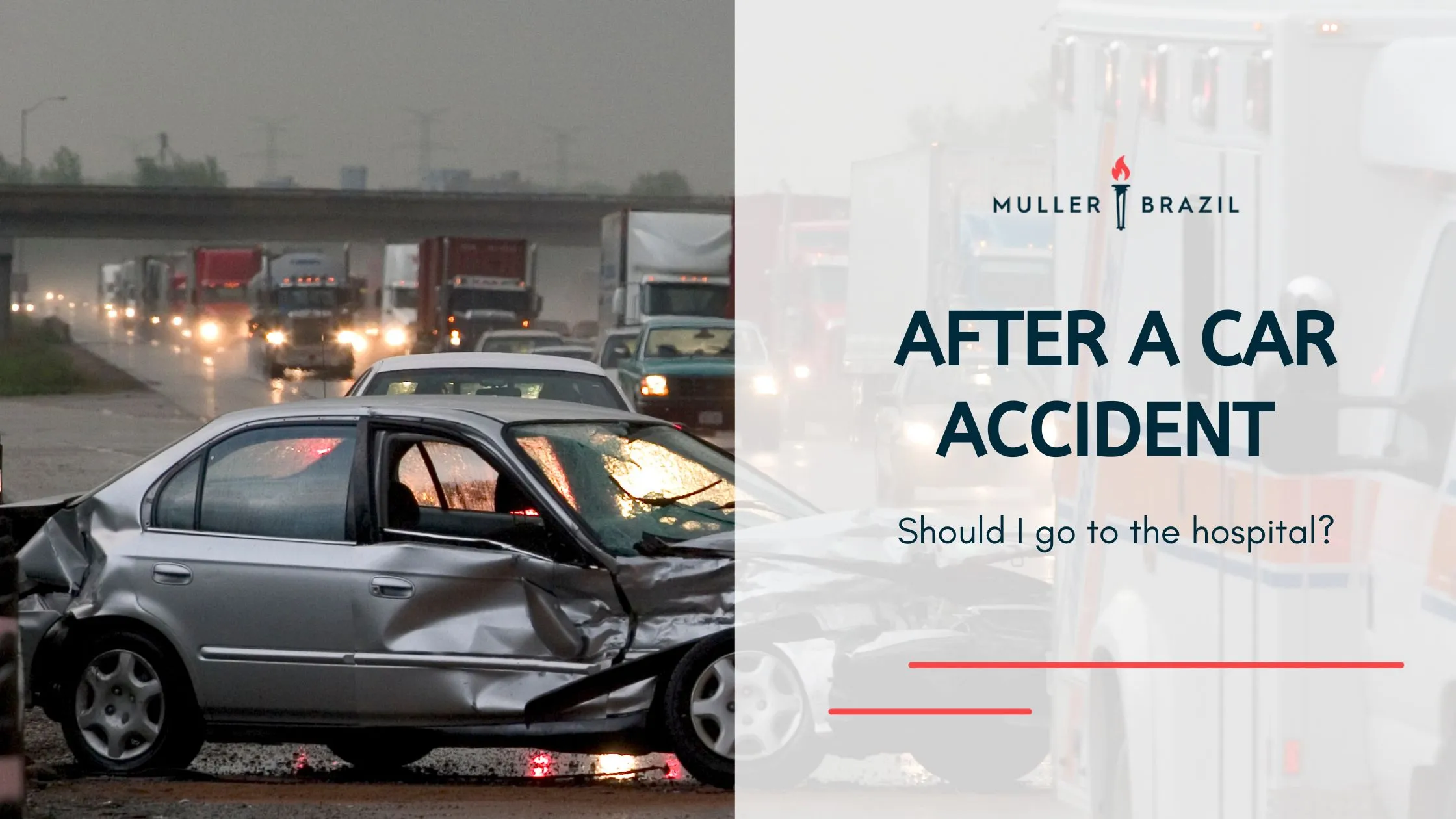6 min read
Should I Go To The Hospital After A Car Accident?
![]() Maximillian J. Muller, Esquire
Oct 9, 2023 12:31:52 PM
Maximillian J. Muller, Esquire
Oct 9, 2023 12:31:52 PM
Yes, you should go to the hospital after a car accident. It's important to get medical help right away after a car accident, even if you feel fine. Some injuries, like internal bleeding or brain injuries, might not show symptoms immediately. Seeing a doctor quickly ensures that any injuries are found and treated early, which is not only good for your health but also important for any insurance claims or legal actions you might need to take.
Doctors' reports can prove that your injuries were caused by the accident, which can help you with insurance or in court if needed. Therefore, always get checked out at a hospital or an urgent care center after an accident.
Between 2017 and 2018, the CDC found that about 3.4 million people each year needed emergency room care due to car accident injuries. This shows how common and severe these injuries can be, highlighting the need to get medical attention right after a car crash.
This article explains why it's so important to see a doctor after a car accident, not just for your health right away but also for legal reasons. Whether you go to an urgent care, your regular doctor, or an emergency room, it's crucial to get checked out. With guidance from our legal experts, we aim to help people who've been in car accidents make the best decisions for their health and future.
Quick Takeaways
- Seek Immediate Medical Attention: Prompt medical care is necessary after a car accident, even for seemingly minor injuries, to address hidden injuries and strengthen insurance claims.
- Document Everything: Keep thorough records of the accident, injuries, medical treatments, and expenses for insurance claims and legal proceedings.
- Know Your Rights: Understand your rights and seek legal assistance from a personal injury lawyer to navigate insurance claims and legal processes effectively.
- Prioritize Health and Justice: Always prioritize your health, but also advocate for justice and fair compensation to cover medical expenses, lost wages, and other damages resulting from the accident.
What Happens In The Immediate Aftermath Of A Car Accident
The moments right after a car accident can be overwhelming. Amidst concerns about injuries and vehicle damage, it's easy to forget your health. Emergency medical technicians (EMTs) are often the first responders, focusing on those with visible and life-threatening injuries.
But not all injuries are immediately apparent. Internal injuries like bleeding or brain trauma might not show symptoms right away. That's why it's important to consider going to urgent care or the emergency room, even if you feel okay or only have minor injuries. Sometimes, delayed symptoms can be misleading, and what seems minor could be more serious.
Besides your health, there are legal considerations, too. Documenting your condition and the accident early on can be crucial for any potential legal actions. It helps establish the immediate impact of the crash, which is vital for determining fault and seeking compensation later.
Should I Seek Medical Attention Immediately?
The answer leans heavily towards not delaying. Some serious injuries, like internal bleeding or a traumatic brain injury, can have latent symptoms. For example, you might not immediately feel the effects of a concussion from hitting your head in the accident. This delay might lead individuals to believe they're fine, especially if they only feel moderate injuries. However, underlying injuries can be much more dangerous than expected, revealing themselves days or even weeks after the car accident. The options available for medical evaluation vary. While an emergency room provides comprehensive care, especially for more severe issues, an urgent care center might be more accessible for quick check-ups.
Remember, even if you've already received preliminary care from emergency medical technicians, seeing a medical professional for a thorough examination is still important. Beyond immediate health concerns, seeking timely medical treatment ensures that medical records are updated, which can be invaluable for any personal injury lawyer representing your case. Medical expenses, from medical bills to the costs of follow-up care, can mount quickly, making it essential to establish a record of immediate medical attention for a potential personal injury claim.
What Are Commonly Unnoticed Injuries and Delayed Symptoms
Car accidents can result in injuries that may go unnoticed initially or manifest symptoms later. Some common examples include:
- Whiplash: Whiplash occurs when the neck jerks back and forth suddenly, and it is often seen in rear-end collisions. Symptoms, including neck pain, stiffness, and headaches, may not appear until hours or days after the accident.
- Soft Tissue Injuries: Damage to muscles, ligaments, and tendons can cause pain and discomfort that might not be immediately apparent. Symptoms may develop gradually, becoming more pronounced over time.
- Concussions: Traumatic brain injuries (TBIs), such as concussions, can occur even in seemingly minor accidents. Symptoms like headaches, dizziness, and cognitive difficulties might not arise until hours or days later.
- Internal Injuries: Internal bleeding or organ damage may not present obvious symptoms immediately after an accident. However, signs such as abdominal pain, swelling, or fainting could indicate a serious underlying issue that requires immediate medical attention.
How To Track The Cost of Treating Your Car Accident Injuries
After a car accident, keeping track of the costs associated with treating your injuries is important. This includes medical expenses such as:
- Hospital bills
- Doctor's visits
- Medications
- Therapy sessions
Additionally, you may incur other expenses related to your recovery, such as transportation to and from medical appointments or modifications to your home to accommodate any disabilities.
Keeping detailed records of all expenses related to your injuries can help you accurately assess the financial impact of the accident. This information will be valuable when seeking compensation from insurance companies or pursuing a personal injury claim against the at-fault party.
Maintaining thorough documentation can strengthen your case by providing evidence of the extent of your injuries and the associated costs. This documentation may include:
- Medical bills
- Receipts for out-of-pocket expenses
- Correspondence with healthcare providers
- Records of missed workdays due to injury-related appointments or recovery time
By diligently tracking the cost of treating your car accident injuries, you can better advocate for yourself and guarantee that you receive the compensation you deserve for your medical expenses and related losses.
What Needs to Be Done for Insurance And Legal Cases?
- Seek Immediate Medical Attention: Your health is important, but timely medical care strengthens your insurance claim. Delayed treatment might signal to insurers that your injuries aren't severe, potentially affecting your compensation.
- Document Everything: Keep records of all medical treatments, which are necessary for insurance claims and legal proceedings. Your health insurance coverage hinges on timely documentation, and these records help your personal injury lawyer build a strong case.
- Maximize Your Insurance Claim: Confirm your insurance covers all aspects of your experience, from injuries to potential lost wages. Prompt medical treatment reinforces your claim's validity and can lead to rightful compensation.
- Consider Legal Assistance: Processing insurance claims and legal procedures can be confusing. Consulting a car accident lawyer guarantees that you are properly represented and positioned to seek compensation for any injustices or financial burdens you've faced.
A Personal Injury Lawyers Job After a Car Accident
Managing the aftermath of a car accident can be daunting. Personal injury lawyers offer expertise to help victims through this challenging process.
- Legal Guidance: Personal injury lawyers are your advocates, guiding you through the complexities of the legal system and helping you maximize compensation for medical bills, pain, suffering, and lost wages.
- Evidence Gathering: Lawyers gather necessary evidence, including medical records, eyewitness accounts, and accident scene reconstructions, to strengthen the legal case against responsible parties.
- Negotiating with Insurance: Lawyers negotiate with insurance companies to guarantee victims receive fair compensation, advocating for full coverage of current and future medical expenses and additional damages for emotional trauma or loss of companionship.
- Court Advocacy: If necessary, lawyers are prepared to take the case to court, advocating for victims by proving negligence or highlighting the severity of injuries to secure justice.
Final Remarks
It's important to underline the article's core premise: Should I go to the hospital after a car accident? The answer is a resounding 'Yes'. Always prioritize your health. But alongside, remember to arm yourself with legal counsel. These steps make sure that individuals aren't just healing physically but are protected against the often-overlooked emotional and financial repercussions of accidents.
In the recovery period following a car mishap, always remember to tend to your health and rights. It's not just about healing and medical treatment; it's about justice, compensation, and securing a path to recovery.
What Causes Most Car Accidents?
Common causes of car accidents include:
- Distracted driving (like texting)
- Speeding
- Driving under the influence
- Adverse weather conditions
- Disregarding traffic signals
Understanding these causes can help drivers stay alert and reduce their accident risk.
What Are Typical Car Accident Settlements?
Car accident settlement amounts vary widely based on injury severity and property damage. Settlements aim to cover medical bills, lost wages, and pain and suffering. A personal injury lawyer can guide your case's expected settlements, ensuring fair compensation.
What to Document After a Car Accident?
After a car accident, document the scene, vehicles involved, and any injuries with photos. Gather contact and insurance information from all parties, obtain witness statements, and file a police report. This documentation is crucial for insurance claims and legal proceedings.
How to Choose Medical Care After a Car Accident?
Choosing medical care depends on injury severity. For life-threatening injuries, go to the emergency room. Urgent care or your primary care physician may suffice for less severe injuries. Prioritize your health and seek immediate attention to address any hidden injuries.
Meet the Author
Max Muller - Founding Partner
Maximillian J. Muller is a founding member of Muller Brazil and My Vaccine Lawyer. Mr. Muller is an experienced litigator in both Federal and State Courts in the areas of vaccine injury, unsafe drug and medical device injury, personal injury, mass torts, and bad faith. Mr. Muller prides himself on keeping Muller Brazil on the cutting edge of injury litigation and running a client-focused practice.
Learn more about Max Muller ⇒


